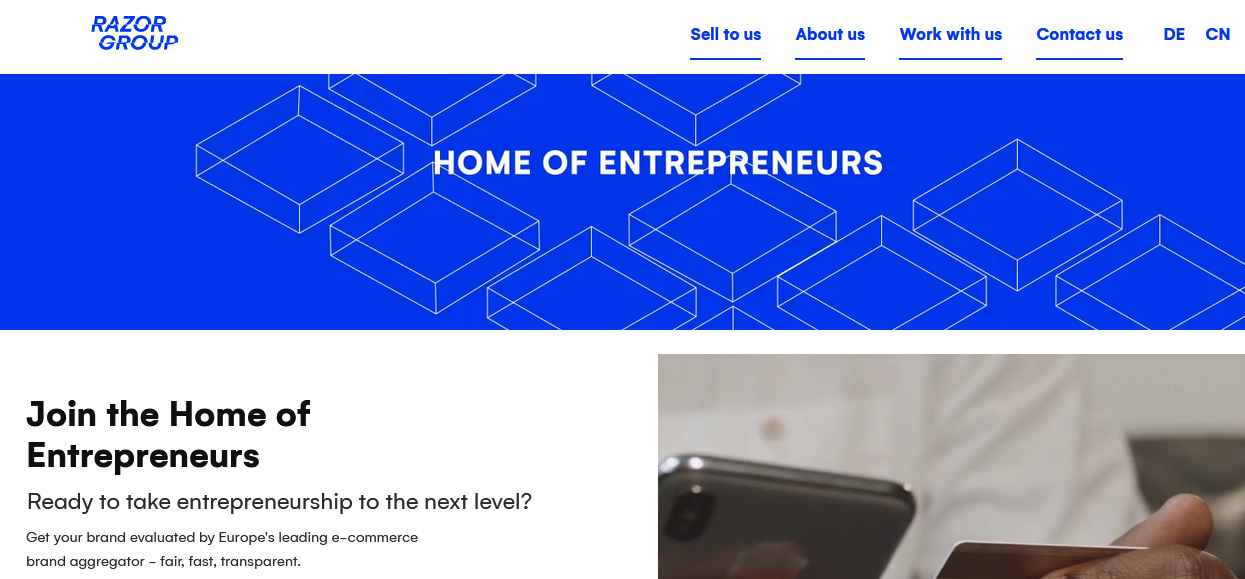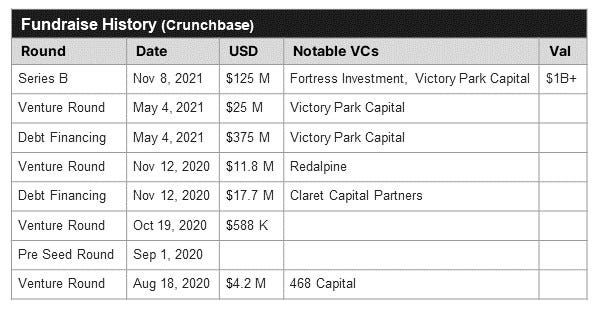Razor Group - Amazon FBA Acquirer
Founded in 2020, Razor Group is a global consumer holding company that partners with e-commerce merchants to acquire and scale their brands.
These briefs are produced by leveraging publicly available data sources and information. If you notice a mistake or see an area for improvement, please let us know through this typeform or via email (team@sandhill.io).
Snapshot
Founded in August 2020, Razor Group is a consumer holding company that partners with ecommerce brands to acquire their Amazon FBA businesses. It then scales these brands by using growth capital and in-house ecommerce expertise. The company focuses on specific product categories and aims to enhance value in the long-term while maintaining customer satisfaction.
Based out of Berlin, Germany, Razor Group also has operations in Austin, Hangzhou, London and New Delhi. To date, it has raised a total of $559.8M in funding over 8 rounds. In November 2021, the company was valued at $1B+.
About Razor Group: Website, LinkedIn
Business Overview and Products
Razor Group acquires businesses it deems worthy from 3rd party sellers on Amazon and scales them up. The targeted brands are typically generating between $1M and $15M in annual revenues. A 3-step process is followed for acquiring the business.
Once a potential brand has been identified, the first step involves Razor having a call with the seller to learn more about their business to assess whether it would be a good match to bring onboard with the ‘Razor Ecosystem’. The process moves forward if both parties are willing.
Next, Razor deep-dives into the business. It quickly evaluates the important aspects of the brand (at no cost) by looking into the key financial data, P&L and operations of the business. This enables Razor to have a fair evaluation of the business. A deal structure is agreed upon and a Letter of Intent is signed where both parties agree on a purchase price and move further in the process.
The final step is closing and integration. A Due Diligence process takes place where the target business’s commercial, financial and legal history is checked by Razor’s Due Diligence team, financial advisors and lawyers. Razor transfers the payment within the next week. The total process spans roughly 6 weeks – from the valuation of the Amazon FBA business to getting all the documents cleared and finally transferring the seller’s money to their bank account.
How It Works
Razor identifies FBA businesses that have the potential to grow and then acquires them from 3rd party sellers. The technology they use performs massive due diligence and rapidly evaluates the businesses’ performance to shortlist those for acquisition. Some of the criteria used for evaluation includes checking product quality, customer ratings, product complexity and growth potential. They bypass any reliance on brokers for these acquisitions due to the efficiency of their own algorithms which leads to better pricing.
In such a quick process, the group aims to reach these lucrative businesses faster so they are able to build strong relationships with the sellers without any time pressure. After screening, shortlisting and acquiring new brands according to the criteria, Razor proceeds to streamline and scale operations for these brands through its proprietary tech stack. This includes technologies such as DoubleClick Conversion, Google Analytics, Google Global Site Tag and more. It also diversifies sales channels, turning the brand into a multichannel business and eventually reducing its dependency on Amazon.
Razor’s data processing then provides insights to grow these businesses and figure out viable options to sell them on platforms other than Amazon.
Business Model and Pricing
Razor Group’s business model is based on integrating select merchants into a wider operations framework run by the company. This is called the ‘FBA Rollup’ model, whereby businesses that have been built on the platform provided by Amazon are consolidated.
In terms of pricing, Razor’s valuations are flexible to accommodate a seller’s preference. For example, some sellers prefer upfront payment, others prefer participating in the growth journey through profit sharing or to stay onboard post-acquisition. The baseline deal structure that Razor offers has two components:
A base purchase price, paid to sellers immediately upon acquisition
A profit sharing scheme, an opportunity for sellers to continue to share profits after acquisition. Generally, 20%–50% of additional profits reaped in the first 2 years of acquisition are shared with the seller.
As explained by founder Jonas Diezun, Razor’s valuations generally range from a multiple of 2.5x–6x on net profits. This includes both base purchase price as well as profit share.
Traction
In May 2021, founder Tushar Ahluwalia stated that the group was on track to cross $120M in sales from the 30 brands it had acquired. The company also predicted crossing $480M in sales in the following 12-15 months. In November 2021, Razor Group shared that it is on track to having 80+ merchants onboard by the end of 2021 and is aiming to pass $1B in sales in 2022. The company had analyzed roughly 1.5M Amazon merchants and shortlisted about 80K of them so far.
Moreover, the company was overall profitable in 2021, and earned $400M in revenues for the year. According to CEO Tushar Aliawala, 70% of Razor’s revenues were reaped from the US, and 12% of revenues were generated from platforms other than Amazon. The company aims to increase that share to 20% in the next 3 quarters.
Founder(s)
Tushar Ahluwalia: Co-founder and CEO. He spent the last decade building market-leading consumer tech companies like StalkBuyLove, a D2C fast-fashion private label company.
Jonas Diezun: Co-founder and CCO. Recently he founded two direct-to-consumer businesses, Franksmile and Radice. Prior to his founder's experience Jonas was CMO at Konux.
Christoph Felix Gamon: Co-founder and VP Acquisitions. Prior to Razor he was Venture Director at Rocket Internet for several years and TMT investment banker at UBS.
Oliver Dlugosch: Co-founder and VP Operations. Prior to Razor he worked at McKinsey & Company as a consultant for several years while completing his PhD in Economic Sciences.
Shrestha Chowdhury: Co-founder and VP Tech/Analytics. Prior to Razor, she was the Chief Product Officer at StalkBuyLove, where she led the Technology and Digital Marketing functions.
History and Evolution
Note: Currencies have been converted from Euro to Dollar based on a currency converter.
In an article by founder Jonas Diezun, he explains that amidst the coronavirus pandemic, the e-commerce sector was provided a catalyst to grow. In particular the online presence of the retail sector grew significantly, and the pandemic brought forth new online shopping behaviors. Sellers on Amazon were (and still are) bringing amazing businesses through the platform. These factors were taken into account by the founders as they established Razor Group.
The Razor Group was founded in 2020 and has been doing quite well in its short operating history. Based out of Berlin, Razor quickly began partnering with e-commerce merchants to acquire and scale their brands. Its goal since inception was to focus on specific product categories and growing long-term value.
According to Techcrunch, by May 2021 the company grew to 107 employees across 4 offices. It also acquired a mixture of debt and equity funding. The equity was meant to be invested in the startup itself and the debt was to be used for acquisitions. Considering $375M of the total $400M was debt funding, it highlighted Razor Group’s ambitious goals for acquisitions.
In November 2021, Razor Group closed a $125M Series B funding round. According to the founders, the company plans on using these funds to continue to expand its business reach and diversify its portfolio. Today, it has a diversified portfolio of FBA brands across Europe and the US operating in multiple categories.
Despite the existence of several other companies following the same business model as Razor Group, it believes that its particular point of differentiation is the technology it uses in the process of identifying and buying brands, and then growing them. Through its specific technology, the focus also lies in the quick response to the market, which includes snapping up businesses that have potential faster than their competitors. For example, the ‘M&A 2.0’ Platform that Razor uses evaluates about 1 million companies each week as they perform on platforms like Amazon.
Additional Learnings
The May 2021 funding round of $400M had the involvement of FJ Labs and Global Founders Capital, the VC firm co-founded by the Samwer Brothers who are well-known for their e-commerce incubator Rocket Internet. Two of Razor’s co-founders, Ahluwalia and Gamon, are Rocket Internet alums, which may or may not have played a role in securing the support of the VC firm.
Two of Razor’s co-founders, Ahluwalia and Chowdhury, had also previously worked on an e-commerce business in India called Stalkbuylove. However, the business ran out of cash and shut down.
Startups that have been founded on an opposite business model are also cropping up. For example, an e-commerce company called Jungle Scout provides tools to these 3rd party sellers that helps them stay independent and grow. They also help them become more valuable for acquisitions by firms such as Razor Group.
By November 2021, 12% of Razor’s revenue comes from platforms other than Amazon and the company aims to reach 20%.
Market Snapshot
In 2019 alone, 2.5 million merchants sold goods worth R €200B globally via Amazon. The US is the largest country on Amazon’s marketplace and Germany is the second largest.
By May 2021, it was estimated that there were about 5 million 3rd party sellers on Amazon, whereby more than 1 million sellers had joined the platform in 2020 alone.
Of the startups following this model, Razor’s numbers indicate it is one of the biggest startups in Europe as of November 2021 and more than 70% of its revenue comes from the US.
Suggested Next Reads
Selling your Amazon Business with Razor (Medium, April ‘21)
Berlin’s Razor Group raises $400M to buy and scale Amazon Marketplace merchants (TechCrunch, May ‘21)
Berlin’s Razor Group raises $125M at a $1B+ valuation for a platform to buy and scale third-party Amazon merchants (TechCrunch, November ‘21)








